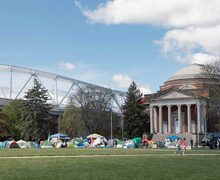Here’s how SU has implemented demands from student groups so far
Corey Henry | Photo Editor
There have been at least 25 racist, anti-Semitic and bias-related incidents on or near SU since early November.
Syracuse University has begun implementing reforms in response to student demands made last fall.
At least 25 racist, anti-Semitic and bias-related incidents have occurred at or near SU since Nov. 7. The incidents sparked forums, student protests and calls for university-wide reform.
#NotAgainSU, a Black student-led movement, presented Chancellor Kent Syverud with a list of 19 demands Nov. 21 to meet in response to the incidents. Jewish, international and indigenous students also shared concerns and solutions.
Syverud signed 16 of #NotAgainSU’s 19 demands as written and revised the remaining three. He also agreed to the requests of Jewish and international students. The concerns and solutions of indigenous students remain under discussion, according to an SU website tracking the university’s response to demands.
Here is an update on the progress university officials have made in implementing students’ requests:
Demands from #NotAgainSU
Student protesters demanded a housing portal to select roommates based on mutual interests and identities. The movement also called for expanding multicultural learning communities to more residence halls.
SU announced Feb. 3 the expansion of a multicultural living community for sophomores, juniors and seniors. The university also signed a contract with My College Roomie, a student roommate matching software company, to pair students based on shared interests. The company’s services will be implemented in the spring.
Syverud revised #NotAgainSU’s demand for a housing portal based off of identities, citing legal restrictions.
#NotAgainSU demanded that any students involved in hate crimes and acts of racism face punishment, including expulsion.
The university will immediately suspend any student involved in bias-related vandalism or graffiti, Rob Hradsky, vice president of the student experience, announced Jan. 29. Students who witness, protect or know an individual who commits the acts will also be held accountable, he said.
Hiring counselors to represent marginalized identities on campus and counselors with language fluency was also one of the movement’s demands. #NotAgainSU also called for diversity and inclusion training for all SU counselors by fall 2020.
SU created and posted four additional counseling positions and is seeking an associate director for diversity and inclusion at the Barnes Center at the Arch. Current supervisors at the Barnes Center attended a diversity, equity and inclusion session Jan. 22.
Reforming SEM 100 to accurately address modern diversity issues was the movement’s second demand. SU’s website tracker states that curriculum changes are under consideration for fall 2020.
#NotAgainSU demanded that the Office of Student Living allocate more funding for programming, multicultural events and residence adviser training. Since then, SU has allocated more than $135,000 to expand OSL staff development and support diversity and inclusion.
SU also hosted a daylong professional development session on issues of diversity and inclusion for all OSL staff Jan. 30. OSL and the Office of Multicultural Affairs doubled capacity for the Students of Color Leadership Retreat and established an International Students Leadership Retreat for fall 2020.
Student protesters also called for SU to invest in student volunteer opportunities to serve low-income communities of Syracuse. The university is investing more than $300,000 to better serve these communities.
International student concerns
Racist graffiti targeting Asian people have been found in multiple SU residence halls, and a slur was yelled at a Chinese student Nov. 16.
In response, international students demanded that the administration allocate funding for more opportunities to encourage domestic students’ understanding of other cultures.
SU appointed Juan Tavares, director of the Center for International Services, as a liaison between communications and international students. SU’s Office of Enrollment and the Student Experience allocated more than $400,000 to expand diversity programing and add four additional staff to the Center for International Services.
Hiring more multilingual resident advisors and increasing diversity training for all RAs was another demand of international students. Of the 175 spring 2020 RAs, 56% identify as students of color and 39 are multilingual. The Office of Student Living hired 14 new RAs who identify as students of color for the semester.
The students also requested more scholarships for “international students with outstanding academic performance, social practice or other excellent abilities.” No new scholarships for international students have been established since the demand was made.
Jewish student concerns
Swastikas have been found written in SU residence halls, Bird Library, Marshall Square Mall and etched in a snowbank near the 505 on Walnut luxury apartment complex. A white supremacist manifesto was also allegedly sent to students’ cellphones in Bird Library.
Students’ first demand was for SU to ensure university cameras are in working order.
In response, SU installed additional cameras in Day Hall on Dec. 1. Campus Safety and Emergency Services has evaluated the installation and is developing a plan and budget estimate for similar installations in additional residence halls.
Hradsky is also working with Hillel staff on a draft structure for a Marginalized Identity Student Leadership Coalition consisting of faculty and staff. The coalition will meet to discuss group campus climate concerns.
Published on February 4, 2020 at 11:20 pm




